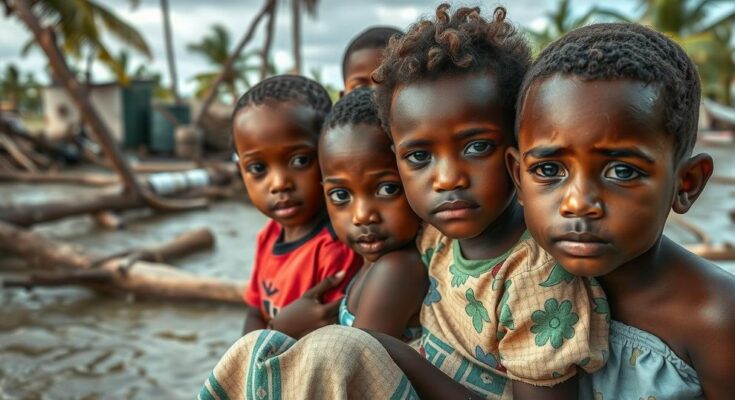Tropical Cyclone Chido has devastated northern Mozambique, affecting about 90,000 children. The storm damaged over 35,000 homes, destroyed 186,000 classrooms, and hit health facilities. The humanitarian situation is dire in a region already facing conflict and disease. Urgent aid is necessary to support those affected, especially vulnerable populations like children.
Tropical Cyclone Chido has severely impacted northern Mozambique, particularly the Cabo Delgado province, resulting in catastrophic damage. Currently, over 90,000 children have been affected, with UNICEF reporting more than 35,000 homes destroyed or damaged. The cyclone struck near Pemba, causing widespread devastation to infrastructure, including 186,000 destroyed classrooms and 20 damaged health facilities. The total number of affected individuals may escalate from the current assessment indicating 174,000 people impacted as evaluations continue.
The situation is further exacerbated by the region’s ongoing struggles with conflict and disease outbreaks, which have already placed children in life-threatening circumstances, as noted by UNICEF representative Mary Louise Eagleton. Moreover, Cabo Delgado has experienced seven years of conflict, displacing over 1.3 million individuals, predominantly women and children. Cyclone Chido has regrettably worsened existing hardships, as many families have lost their homes again. The cyclone also caused significant damage in the neighboring provinces of Nampula and Niassa, affecting vital services and increasing the risk of cholera outbreaks in the area.
The recent Tropical Cyclone Chido, which hit Mozambique, marks another challenge for a country already grappling with the effects of climate change, prolonged conflict, and public health crises. The Cabo Delgado province has faced years of turmoil due to conflict, making its population especially vulnerable to natural disasters. The response from various agencies, including UNICEF and the World Health Organization (WHO), emphasizes the urgent need for humanitarian assistance in the wake of the cyclone, which has impacted vast numbers of homes, schools, and health facilities. The region, characterized by significant infrastructure needs and inadequate resources, needs concerted global effort to address the immediate impacts of this humanitarian crisis.
In summary, Cyclone Chido has left an indelible mark on Mozambique, particularly affecting the younger population. With vast infrastructure damage and a worsening humanitarian situation exacerbated by pre-existing issues of conflict and disease, the need for immediate and sustained aid is paramount. International efforts and local partnerships remain crucial in addressing the urgent needs of the affected communities, particularly for children and vulnerable groups. The cyclone’s impact underscores the complex challenges faced by Mozambique in the realm of climate resilience and humanitarian response.
Original Source: news.un.org




